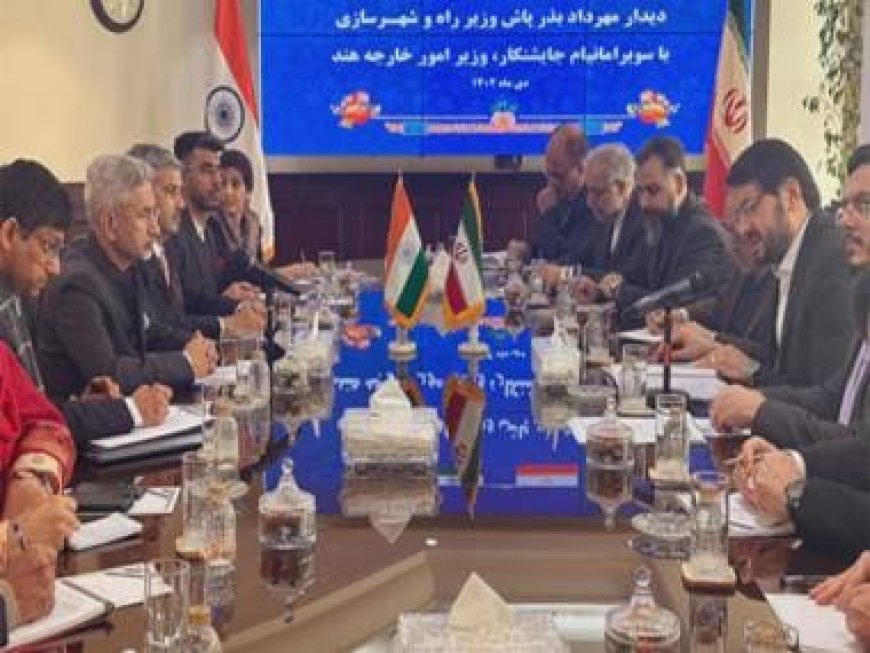Chabahar port central to bilateral ties, says MEA Jaishankar during Iran visit
Chabahar port central to bilateral ties, says MEA Jaishankar during Iran visit

The Chabahar port is essential to improving connectivity and developing India-Iran bilateral ties, as External Affairs Minister S Jaishankar noted on Monday.
In a joint press conference with his Iranian counterpart H Amir-Abdollahian, Jaishankar emphasized India’s dedication to the shared connectivity vision for the Chabahar port project.
Jaishankar emphasized the strategic importance of the port as a crucial component in boosting regional trade and cooperation. “In particular, we discussed India’s involvement in the development and operation of the Chabahar port, a joint project with a joint vision of connectivity,” he said.
“In particular, we discussed India’s involvement in the development and operation of the Chabahar port, a joint project with a joint vision of connectivity,”stated Jaishankar, emphasizing the strategic significance of the port as a key element in enhancing regional trade and cooperation.
Jaishankar highlighted India’s commitment to this project, and discussed, “How we can develop a strong, sustainable and long-term plan, for India’s sustained involvement over the coming years. Considering the significance of this initiative for both countries, I emphasized that it must be closely watched over by the political leadership.”
During his two-day visit to Tehran, the External Affairs Minister emphasized the importance of regional connectivity in the relationship between Iran and India.
He reaffirmed India’s strong desire to take use of Iran’s strategic location to get access to markets in Afghanistan, Central Asia, and Eurasia.
“Regional connectivity has been a critical pillar of India Iran relations and was naturally prominent in the agenda of today’s discussions. I reiterated India’s interest in benefiting from Iran’s unique geographical position to access markets in Central Asia, Afghanistan and Eurasia,” said the EAM.
He also talked about the possibility of reviving the International North-South Transport Corridor (INSTC), a project intended to make trade routes more efficient.
“We discussed the prospects of energising the International North South Transport Corridor. In particular, we discussed India’s involvement in the development and operation of the Chabahar port, a joint project with a joint vision of connectivity,” he also said.
“I laid emphasis on India’s commitment to this project and discussed how we can establish a firm, sustainable, and long-term roadmap for India’s continued involvement over the coming years,” Jaishankar affirmed.
Recognising the project’s critical importance for both nations, he stressed the need for close monitoring of its progress under the direct supervision of political leadership. “Given the importance of this project for both nations, I emphasise the need to monitor its progress under the direct supervision of the political leadership,” said the EAM.
In a broader context, Jaishankar expressed satisfaction with the comprehensive nature of the bilateral discussions.
“Here we were able to review all aspects of our bilateral engagement quite comprehensively and exchange thoughts on some pressing global and regional issues,” he added, highlighting the depth of the diplomatic exchange between the two countries.
This visit marks Jaishankar’s first visit to Tehran after Iran’s membership approval in BRICS, a development that India strongly supported.
The collaboration in multilateral forums, including the SCO, reflects the strength of the bilateral ties between India and Iran.
“I am confident that today’s exchanges will give momentum to our bilateral cooperation, and also further enhance our understanding of each other’s positions on important regional and global issues,” he said.
India and Iran are longstanding friends who have always seen the development and prosperity of one another as a means of achieving their own.
The Minister of External Affairs stated that the relationship between India and Iran, along with regular consultations, are especially valuable given the unstable and uncertain world that “we currently see”.
In order to connect with the CIS nations, India intends to use Chabahar Port as a transit hub under the International North-South Transport Corridor (INSTC).
When Prime Minister Narendra Modi and Iranian President Seyyed Ebrahim Raisi last spoke in August of last year, they reaffirmed their commitment to advancing bilateral cooperation and, among other things, to realizing the full potential of Chabahar Port as a hub for connectivity.
A vital part of India’s connectivity initiatives, the Iranian port of Chabahar is extremely important because it offers a practical and expedient route for trade between India, Iran, Afghanistan, and Central Asia. The INSTC is a multimodal transportation route that connects the Indian Ocean and Persian Gulf to the Caspian Sea via Iran and then to northern Europe via St Petersburg in Russia.
According to the INSTC, cargo will be transported by sea from Mumbai, India, to Shahid Beheshti Port in Chabahar, Iran; by road from Chabahar to Bandar-e-Anzali, an Iranian port on the Caspian Sea; by ship from Bandar-e-Anzali to Astrakhan, a Caspian port in the Russian Federation; and finally by Russian railways from Astrakhan to other Russian Federation regions and ultimately into Europe.
India’s goal and plan, known as the International North-South Transport Corridor, aims to shorten the time it takes for EXIM cargo to arrive in Russia, Europe, and central Asian markets. If the corridor is successfully opened, it will facilitate trade between India and Central Asian nations as well as Russia. Iran’s Chabahar Port serves as the hub for commercial transit.
(With agency inputs)
What's Your Reaction?



























































